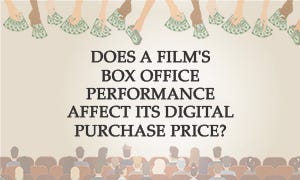Does a film's box office performance affect its digital purchase price?
Last week, I looked at the connection between the quality of a movie and the price of a copy on digital platforms. I found that quality (as measured by IMDb score) doesn't matter for the first few years of release but after a decade, we can see a clear correlation.
This link wasn't strong enough to explain the pricing policy in full. Therefore, I hunted around for other factors we could track which may have a stronger connection with the price.
I studied the purchase price of a digital standalone HD copy of 29,461 movies across six platforms in the US. All movies were theatrically released between 2000 and 2019.
The effect of budget and box office on purchase price
Before I started this research project I guessed that two key factors in a film's perceived value would be its production budget and its performance in cinemas. Both have reasons why they may affect the price and reasons why they may not:
The production budget gives us a sense of how expensive the film was to make, as all other costs typically scale proportionally with budget (i.e. scale of release, cost of marketing, etc). Films with a larger financial outlay may experience pressure to keep digital prices high in order to recoup the investment. Also, bigger films may be seen as more valuable to the consumer, thereby allowing digital platforms to charge more.
The box office performance of a movie is the clearest sign we have as to how popular the film was with paying consumers. On the other hand, it is a single dollar amount and doesn't take account of the differences in prices (i.e. children pay less, off-peak discounts, higher prices for IMAX, etc). These pricing patterns are not echoed when buying the movie digitally as everyone pays the same price, no matter their age, location, time of day or even the number of people who will eventually watch it.
It turns out I was half right.
The production budget of a film has a weak correlation with the digital purchase price on most platforms and zero effect on others.
However, a film's theatrical performance is the greatest corelalated factor I could find. Across all six platforms I studied, a high box office gross often meant a higher digital purchase price.
Splitting by genre
The effect was at its strongest for the more populist genres, such as Fantasy, Action, Sci-Fi and Adventure. At the other end of the spectrum were more niche genres such as Western, Music and Horror.
The effect over time
Last week, we saw that the longer it had been since the film's cinematic run, the more the quality of the movie mattered. I performed the same analysis when looking at box office performance and found an interesting result.
Half of the platforms I studied showed the same broad pattern, with older films having a stronger link to box office gross than newer films.
The other three platforms showed no such link, with Amazon, Apple TV and Vudu always taking box office performance into account, even for new movies.
I'd be happy to test any other theories people have as to what affects a film's digital purchase price. Leave a comment below or drop me a line.
Notes
This research refers to the price to digitally buy a standalone HD copy of a movie on a number of digital platforms. This excludes SD and 4K versions, special editions, box sets or bundles. It relates to the US market and all prices are in US dollars.
The data came from the platforms directly and via third-party listing sites such as Just Watch and Blu-ray.com. I gathered the raw data at the end of 2019 and so it is unaffected by the current pandemic and its resulting home entertainment boom.
A few of you may have spotted that the Google Play and YouTube results are remarkably similar. While they're not identical, I think it's fair to say that they use the same pricing methodology. It's possible that the slight differences between the two are due to price changes over the data collection period.







